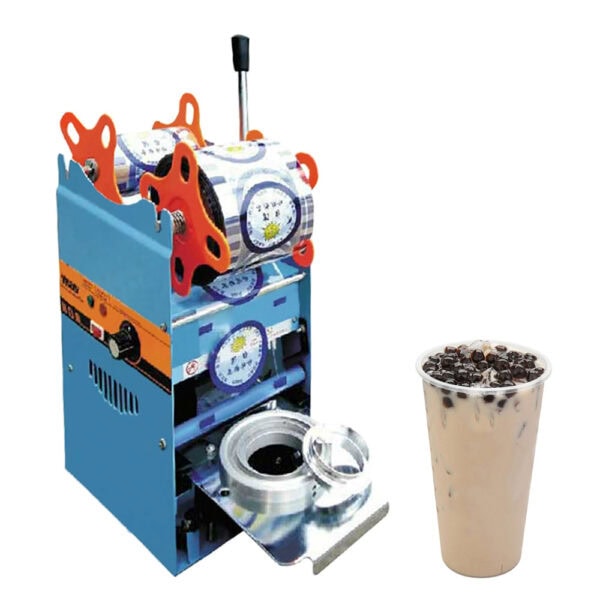For beverage shops and manufacturers, ensuring tight, leak-proof cup seals is critical. Inefficient sealing can cause spills, waste, and customer dissatisfaction. Cup sealing machines automate and ensure a perfect seal every time.
A cup sealing machine works by placing a seal over the cup and applying heat or pressure, bonding the seal to the cup’s rim. This creates an airtight and leak-proof seal, often used in food and beverage industries.
Understanding the components and process of a cup sealing machine reveals why it’s essential for efficient operations.

Basic Components of a Cup Sealing Machine
Cup sealing machines typically consist of a few basic parts, including a sealing film, cup holder, and sealing head. The film is usually plastic or aluminum, which is placed over the cup, and the sealing head presses down to create a firm bond between the film and the cup rim. The process is quick and reliable, making it ideal for high-demand environments such as tea shops or juice bars. With its automated features, the machine minimizes human error, offering consistency in every sealed product.
For businesses using a labeling machine alongside cup sealing machines, the process becomes even more streamlined. Products are labeled, sealed, and ready for distribution efficiently.
How Heat Sealing Works
Heat sealing is one of the most common methods used in cup sealing machines. The machine applies heat to the film, which melts and fuses it to the rim of the cup. The temperature control is essential to ensure a secure bond without damaging the film or the cup. This heat-sealing method is durable and guarantees a tight seal, which is crucial for products like bubble tea, yogurt, or other liquid-based foods.
Many food and beverage companies also integrate other automated systems like Bottle Filling Machines to further optimize their production lines. These systems work in harmony with cup sealing machines, ensuring a smooth workflow.
Methods of Cup Sealing
There are two primary methods for sealing cups: heat sealing and mechanical sealing. Heat sealing utilizes heat to melt and bond a plastic or foil film to the cup, making it ideal for sealing liquids like beverages or sauces. Mechanical sealing, on the other hand, uses pressure or clamps to secure the lid onto the cup, sometimes with the help of adhesives to enhance the bond.
Companies often choose their method based on the product being packaged. For example, liquid-based products benefit from heat sealing because of the leak-proof results it provides, while dry goods may only require mechanical sealing.
Automatic vs. Semi-Automatic Cup Sealing Machines
Cup sealing machines come in both automatic and semi-automatic versions. Automatic cup sealing machines perform all tasks from positioning the cup to sealing it without human intervention, making them ideal for high-volume operations. These machines are commonly seen in busy environments like bubble tea shops or fast-food outlets.
Semi-automatic machines still provide an automated sealing process but require the operator to place the cup manually. This type is suited for businesses with lower demand or those that prefer more manual control over the sealing process.
For larger operations, integrating machines such as a powder packaging machine alongside the sealing machine can further automate and enhance production efficiency, covering various packaging needs from dry to liquid products.
Types of Sealing Films Used
The types of sealing films used in cup sealing machines vary based on the product and the sealing method. The most common materials are plastic and aluminum foil, though some businesses prefer a combination of both for added strength and visibility. Plastic films are favored for their transparency and flexibility, while aluminum offers heat resistance and durability.
When selecting a sealing film, companies must consider the product’s packaging needs. For instance, food products requiring long shelf life may benefit from foil seals, which provide better protection against moisture and contamination.
Applications of Cup Sealing Machines
Cup sealing machines are widely used across industries, especially in the food and beverage sector. In addition to their presence in bubble tea shops, these machines are essential in juice bars, dairy product manufacturers, and even some pharmaceutical companies. Their primary role is to ensure product freshness, prevent leaks, and enhance customer satisfaction by providing an easy-to-open seal that maintains hygiene standards.
Beyond beverages, cup sealing machines are also employed in packaging food items like yogurt, soups, and even dry snacks, offering versatility in different packaging solutions.
Benefits of Cup Sealing Machines
Cup sealing machines provide several key benefits to businesses. First, they enhance efficiency by automating the sealing process, allowing operators to focus on other tasks. Second, they ensure consistency, as each cup is sealed uniformly, reducing waste and improving product presentation. Finally, the airtight seal created by these machines helps maintain the product’s freshness, making them essential for businesses in the food industry.
The use of cup sealing machines, in conjunction with other equipment like a Vacuum Packaging Machine, can significantly improve the preservation of both solid and liquid products, extending their shelf life and quality.
Safety and Maintenance
Proper safety protocols and regular maintenance are essential to keep cup sealing machines operating efficiently. Key maintenance tasks include cleaning the sealing head regularly to prevent the buildup of melted film and replacing any worn-out parts such as rollers or films. Safety procedures should also be followed, such as ensuring that the machine is properly grounded and that no electrical overload occurs.
Like many other industrial machines, these units benefit from routine inspections and updates to ensure optimal performance. Businesses that use label printers alongside their sealing machines should also schedule regular maintenance for those devices to avoid disruptions in production.
Conclusion
Cup sealing machines automate and streamline the sealing process, making them essential for businesses looking to ensure product quality and operational efficiency.









